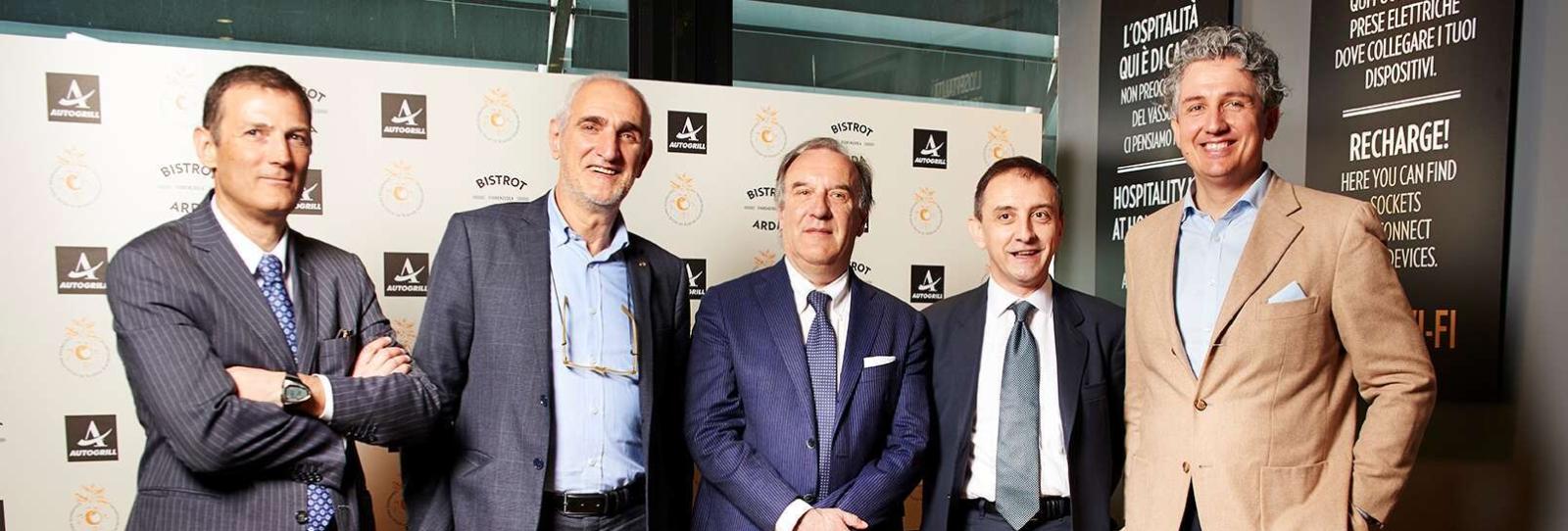During the inauguration of Fiorenzuola d’Arda Bistrot Silvio Barbero, Founder of Slow Food and Vice President of the University for the Study of Gastronomic Sciences at Pollenzo (UNISG), and Michele Fino, Associate Professor of Roman Law and Ancient Laws, reminisced with us about the most important moments of the project that led to the creation of the first motorway Bistrot in Italy, realized by Autogrill with the contribution of UNISG at the historical service area of Fiorenzuola d’Arda, the first bridge-style structure of Europe.
A common goal – the partnership between Autogrill and UNISG
It all began in 2011 with the encounter between these two entities, diverse both by nature and in their operational activities but united by the common desire for innovation in the food and wine sector. With the experimental document “Manifesto for a new Autogrill” UNISG convinced the Chief Executive Officer, Gianmario Tondato, and the Chief Marketing Officer, Ezio Balarini, that the University was the right partner to think up something totally new for the store in Milan Central Station.
Narrating the territory: the choice and the role of the producers
Bistrot in fact, wants to narrate to the traveler the territory in which it's located, and two key elements have been indentified to achieve this objective: the first is genuineness, offering authentic local food without resorting to imitations. So, for example, the bread and pizza at the Fiorenzuola d’Arda Bistrot are made with flour produced in the Oltrepò, the Mariola salami is made according to the original recipe and controlled by Slow Food and the meat comes from local producers like Gavazza and Morini.
The second element is narration: telling the story behind the product, the men and women whose craftsmanship and skill enrich the experience of a stopover in the Bistrot. The employees who work in Autogrill's Bistrot are given this task and are specially trained for it.
Established skills and new discoveries: the choices of Fiorenzuola d’Arda's Bistrot
The selection of products for the Arda Bistrot has followed two essential strands: the confirmation of producers like Molini di Voghera used by the Milano Centrale Bistrot, and Fratelli Gavazza (for meat) by the Milano Duomo Bistrot, and the addition of new producers from the local area discovered as a result of research and selection carried out in the territory.
A stimulating and productive synergy: Bistrot as an opportunity for growth.
From the point of view of growth and improvement Bistrot has had a positive impact on the producers, stimulating the development of new production models and mechanisms and helping small producers to meet new market demands through a process of research and internal analysis.
A turning point for the future of catering on the road
Bistrot has introduced two important innovations in the food and wine culture for the consumer on the road. The aim for simplicity and transparency, fundamental elements with an immediate consumer impact. Increased transparency regarding product origin means a lower environmental impact from the consumption of that product, the more the consumer savors the freshness and genuineness of a product, the higher the value he attributes to it.Continue to follow us on the discovery of the Fiorenzuola d’Arda Bistrot, see you next time!
Silvio Barbero is Vice President of UNISG and of Slow Food Italia, which he helped found in 1990. For the association he collaborates in the preparation of food guides for tourists published in Italy, he is responsible for educational activities on nutrition and taste in schools, for initiatives promoting quality food in hospitals, as well as being the coordinator of projects on sensory education.
Michele Fino is Associate Professor of Roman Law and Ancient Laws at the University of Pollenzo. He previously held positions as a researcher and professor at the University of Ferrara, the University of Eastern Piedmont and the University of Aosta Valley. He is a member of the Italian Society for the History of Law, of ARISTEC and of the Scientific and Technical Committee of CERVIM (Research Center for Mountain Viticulture).

